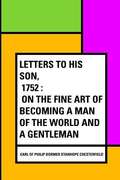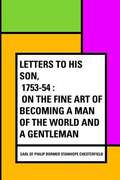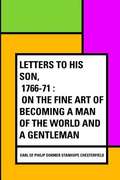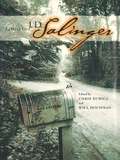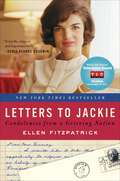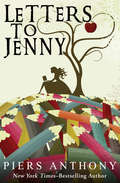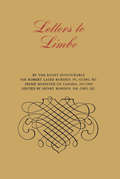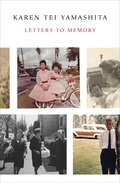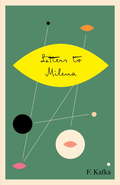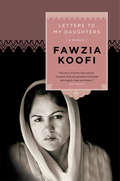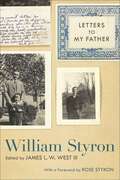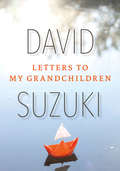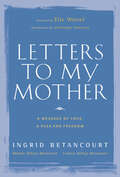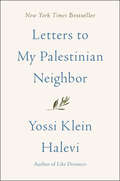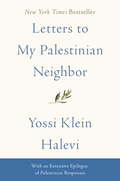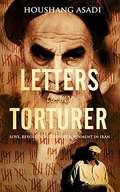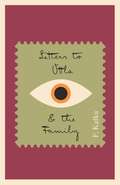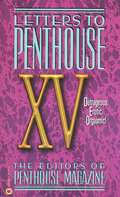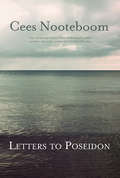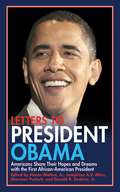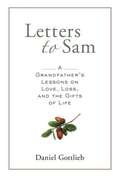- Table View
- List View
Letters to His Son, 1752 / On the Fine Art of Becoming a Man of the World and a Gentleman
by Earl of Philip Dormer Stanhope ChesterfieldEarl of Philip Dormer Stanhope Chesterfield was an 18th century British aristocrat best known for his wit and for being a man of letters. His works offer a great insight into what life was like during the time period in England.
Letters to His Son, 1753-54 / On the Fine Art of Becoming a Man of the World and a Gentleman
by Earl of Philip Dormer Stanhope ChesterfieldEarl of Philip Dormer Stanhope Chesterfield was an 18th century British aristocrat best known for his wit and for being a man of letters. His works offer a great insight into what life was like during the time period in England.
Letters to His Son, 1756-58 / On the Fine Art of Becoming a Man of the World and a Gentleman
by Earl of Philip Dormer Stanhope ChesterfieldEarl of Philip Dormer Stanhope Chesterfield was an 18th century British aristocrat best known for his wit and for being a man of letters. His works offer a great insight into what life was like during the time period in England.
Letters to His Son, 1759-65 / On the Fine Art of Becoming a Man of the World and a Gentleman
by Earl of Philip Dormer Stanhope ChesterfieldEarl of Philip Dormer Stanhope Chesterfield was an 18th century British aristocrat best known for his wit and for being a man of letters. His works offer a great insight into what life was like during the time period in England.
Letters to His Son, 1766-71 / On the Fine Art of Becoming a Man of the World and a Gentleman
by Earl of Philip Dormer Stanhope ChesterfieldEarl of Philip Dormer Stanhope Chesterfield was an 18th century British aristocrat best known for his wit and for being a man of letters. His works offer a great insight into what life was like during the time period in England.
Letters to J. D. Salinger
by Chris Kubica Will HochmanHe published his only novel more than fifty years ago. He has hardly been seen or heard from since 1965. Most writers fitting such a description are long forgotten, but if the novel is The Catcher in the Rye and the writer is J. D. Salinger . . . well, he's the stuff of legends, the most famously reclusive writer of the twentieth century. If you could write to him, what would you say? Salinger continues to maintain his silence, but Holden Caulfield, Franny and Zooey, and Seymour Glass-the unforgettable characters of his novel and short stories-continue to speak to generations of readers and writers. Letters to Salinger includes more than 150 personal letters addressed to Salinger from well-known writers, editors, critics, journalists, and other luminaries, as well as from students, teachers, and readers around the world, some of whom have just discovered Salinger for the first time. Their voices testify to the lasting impressions Salinger's ideas and emotions have made on so many diverse lives. Contributors include Marvin Bell, Frederick Busch, Stephen Collins, Nicholas Delbanco, Warren French, Herbert Gold, W. P. Kinsella, Molly McQuade, Stewart O'Nan, Robert O'Connor, Ellis Paul, Molly Peacock, Sanford Pinsker, George Plimpton, Gerald Rosen, Sid Salinger, David Shields, Joseph Skibell, Melanie Rae Thon, Alma Luz Villanueva, Katharine Weber, and many others
Letters to Jackie: Condolences from a Grieving Nation
by Ellen Fitzpatrick“A terrific, original, and important work….Fitzpatrick provides a stunningly fresh look at the impact of JFK’s assassination on the American people.”—Doris Kearns GoodwinFor Letters to Jackie, noted historian and News Hour with Jim Lehrer commentator Ellen Fitzpatrick combed through literally thousands of condolence messages sent by ordinary Americans to Jacqueline Kennedy following the assassination of her husband, President John F. Kennedy, in 1963. The first book ever to examine this extraordinary collection, Letters to Jackie presents 250 intimate, heartfelt, eye-opening responses to what was arguably the most devastating event in twentieth century America, providing a fascinating perspective on a singular time in the history of our nation.
Letters to Jenny
by Piers AnthonyThe New York Times–bestselling author of the Xanth novels wrote these weekly letters to a fan of is books in the hope of helping her out of a coma. In February 1989, science fiction writer Piers Anthony, author of the Xanth series, received a moving letter. It came from a woman whose daughter, Jenny, was in a coma as a result of severe injuries caused by a drunk driver. She asked Anthony to write to Jenny, an avid fan of his, in the hope that a letter from him would evoke some response. Her request resulted in a series of warm, supportive, and humorous letters written weekly from Anthony to Jenny. These were read to the patient by her mother. The original letters Anthony wrote between February 1989 and 1990, reproduced here along with Anthony&’s comments, reveal the author&’s wit, humanism, and social conscience. Jenny has come out of her coma, but is still confined to a wheelchair. Anthony also named a character in his next Xanth novel after Jenny, whose limited but definite physical responses to his letters indicated how important they were to her.
Letters to Limbo
by Henry Borden Robert BordenRobert Laird Borden, Prime Minister of Canada from 1911 to 1920, was born in the village of Grand Pré, Nova Scotia, in 1854. He practiced law in the province before entering politics. In 1896 he was elected to the House of Commons, and in 1901 was chosen leader of the Liberal-Conservative party.After his retirement in 1920, Sir Robert kept on the sidelines of the political debate, although he was often consulted by those in power and was frequently tempted to express his views on current issues. During the last four years of his life, 1933 to 1937, he recorded some of his thoughts and experiences in the form of 'Letters to Limbo.' Some of these he read over and revised, others he left as dictated. The wide range of his interests is revealed in the topics: union government for Canada? / reminiscences of household pets / inaccuracy of the press / bestowal of honours in Canada / business conditions in the United States / Dean of Canterbury and Social Credit / appraisal of Sir Arthur Currie / King Edward VIII and Mrs. Simpson.All the letters but four are presented in this volume. They reveal some of the inner thoughts and strongest beliefs of Sir Robert, giving an insight into the man and his times. Whimsical and humourous, or serious and well-argued, these letters paint a portrait in words of one of the greatest figures in Canadian history.
Letters to Memory
by Karen Tei YamashitaAn excursion through the Japanese-American internment using archival materials from the author’s own family. In this unique memoir, Karen Tei Yamashita draws on her family’s history and creates a series of epistolary conversations with composite characters representing a range of academic specialties. Historians, anthropologists, classicists—their disciplines, and Yamashita’s engagement with them, are a way for her explore various aspects of the internment and to expand its meaning beyond her family, and our borders, to ideas of debt, forgiveness, civil rights, and community. From a National Book Award finalist, Letters to Memory is “in moments deeply personal and impressionistic and in moments pulling back into a voice of epic omniscience” (The Boston Globe). “Interrogates the cruelty of internment and the random nature of immigration, war, birth and death and disease through her own probing, lively correspondence . . . The irony and dark humor of Yamashita’s interrogations, of her nimble prose and sentences, illuminate the tragedies.” —Los Angeles Times
Letters to Milena
by Franz Kafka Philip BoehmKafka's terrible illness was progressing. He was a man who needed so much time, and who had so painfully little. Kafka lived his whole life as few do; these letters are a testimony to his intense vitality and to his genius as a writer.
Letters to Milena
by Franz KafkaIn no other work does Franz Kafka reeal himself as in Letters to Milena, which begins as a business correspondence but soon develops into a passionate but doomed epistolary love affair. Kafka's Czech translator, Milena Jesenska was a gifted and charismatic twenty-three-year-old who was uniquely able to recognize Kafka's complex genius and his even more complex character. For the thrity-six-year-old Kafka, she was "a living fire, such as I have never seen." It was to Milena that he revealed his most intimate self and, eventually, entrusted his diaries for safekeeping."The voice of Kafka in Letters to Milena is more personal, more pure, and more painful than in his fiction: a testimony to human existence and to our eternal wait for the impossible. A marvelous new edition of a classic text."--Jan Kott
Letters to Milena
by Franz KafkaIn no other work does Franz Kafka reveal himself as in Letters to Milena, which begins as a business correspondence but soon develops into a passionate but doomed epistolary love affair. Kafka's Czech translator, Milena Jesenska, was a gifted and charismatic twenty-three-year-old who was uniquely able to recognize Kafka's complex genius and his even more complex character. For the thirty-six-year-old Kafka, she was "a living fire, such as I have never seen." It was to Milena that he revealed his most intimate self and, eventually, entrusted his diaries for safekeeping."The voice of Kafka in Letters to Milena is more personal, more pure, and more painful than in his fiction: a testimony to human existence and to our eternal wait for the impossible. A marvelous new edition of a classic text."--Jan Kott
Letters to My Daughters
by Fawzia KoofiIn the vein of Infidel comes this spellbinding memoir of survival and courage from Afghanistan's most popular female politician.On the day Fawzia Koofi was born, her mother set her under the blazing Afghan sun to die. She was the nineteenth child of twenty-three in a family with seven wives, and her mother did not want another daughter. Despite severe burns that lasted into her teenage years, Fawzia survived and became the favourite child.In Letters to My Daughters, Fawzia tells her remarkable life story. Fawzia's father was an incorruptible politician strongly attached to Afghan tradition. When he was murdered by the mujahedeen, Fawzia's illiterate mother decided to send the ten-year-old girl to school, and as the civil war raged, Fawzia dodged bullets and snipers to attend class, determined to be the first person in her family to receive an education.She went on to marry a man she loved, and they had two cherished daughters, Shohra and Shaharzad. Tragically, the arrival of the Taliban spelled an end to her freedom. Outraged and deeply saddened by the injustice she saw around her, and by the tainting of her Islamic faith, Fawzia discovered politics herself.
Letters to My Father (Southern Literary Studies)
by William Styron“I’ve finally pretty much decided what to write next—a novel based on Nat Turner’s rebellion,” twenty-six-year-old William Styron confided to his father in a letter he wrote on May 1, 1952. Styron would not publish his Pulitzer Prize–winning The Confessions of Nat Turner until 1967, but this letter undercuts those critics who later attacked the writer as an opportunist capitalizing on the heated racial climate of the late 1960s. From 1943 to 1953, Styron wrote over one hundred letters to William C. Styron, Sr., detailing his adventures, his works in progress, and his ruminations on the craft of writing. In Letters to My Father, Styron biographer James L. W. West III collects this correspondence for the first time, revealing the early, intimate thoughts of a young man who was to become a literary icon. Styron wrote his earliest letters from Davidson College, where he was very much unsure of himself and of his prospects in life. By the last few letters, however, he had achieved a great deal: he had earned a commission in the Marine Corps, survived World War II, published the novel Lie Down in Darkness (1951) and the novella The Long March (1953), and won the Prix de Rome. He had also recently married and was about to return to the United States from an expatriate period in Paris and Rome. The letters constitute a portrait of the artist as a young man. They read like an epistolary novel, with movement from location to location and changes in voice and language. Styron was extremely close to his father and quite open with him. His story is a classic one, from youthful insecurity to artistic self-discovery, capped by recognition and success. There are challenges along the way for the hero—poor academic performance, a syphilis scare, writer’s block, temporary frustration in romance. But Styron overcomes these difficulties and emerges as a confident young writer, ready to tackle his next project, the novel Set This House on Fire (1960). Rose Styron, the author’s widow, contributes a prefatory memoir of the senior Styron. West has provided comprehensive annotations to the correspondence, and the volume also has several illustrations, including facsimiles of some of the letters, which survive among Styron’s papers at Duke University. Finally, there is a selection of Styron’s apprentice fiction from the late 1940s and early 1950s. In all of American literature, no other extended series of such letters—son to father—exists. Letters to My Father offers a unique glimpse into the formative years of one of the most admired and controversial writers of his time.
Letters to My Grandchildren
by David SuzukiIn this inspiring series of letters to his grandchildren, David Suzuki offers grandfatherly advice mixed with stories from his own remarkable life and explores what makes life meaningful. He challenges his grandchildren - and us - to do everything at full tilt. He explains why sports, fishing, feminism, and failure are important; why it is dangerous to deny our biological nature; and why First Nations must lead a revolution. Drawing on his own experiences and the wisdom he has gained over his long life, he decries the lack of elders and grandparents in the lives of many people, especially immigrants, and champions the importance of heroes. And he even has something to say about fashion. The book also provides an intimate look at Suzuki's life as a father and grandfather with letters that are chock-full of anecdotes about his children and grandchildren when they were small. As he ponders life's deepest questions and offers up a lifetime of wisdom, Suzuki inspires us all to live with courage, conviction, and passion.
Letters to My Mother: A Message of Love, A Plea for Freedom
by Ingrid Betancourt Lorenzo Delloye-Betancourt Melanie Delloye-BetancourtCorrespondence between politician Ingrid Betancourt and her family, written while she was being held hostage by a Columbian guerilla group. On December 1, 2007, during the arrest of several guerillas in Bogotá, the Colombian police confiscated a short video clip of political hostage Ingrid Betancourt. Accompanying the video was a twelve-page letter, dated October 24, 2007, written by Betancourt to her mother and family. Kidnapped on February 23, 2002, Betancourt has become an international symbol in the struggle for liberty and the fight against barbarity. Before being captured by the Revolutionary Armed Forces of Colombia (FARC), she was a voice of hope for the Colombian people, leading a courageous fight against political corruption, violence, and illegal detentions. Presented in this small, poignant book is Betancourt&’s letter to her mother printed in English, French, and Spanish. From the depths of the Colombian jungle, Betancourt&’s words are an impassioned declaration of love to those dearest to her. In addition to this letter is a response to Betancourt written by her children who, since they were teenagers, have rallied public support for their mother&’s release. With a preface by Nobel Peace Prize Laureate Elie Wiesel, Letters to My Mother conveys a powerful message of love for family and country, and a heartrending plea for freedom.
Letters to My Palestinian Neighbor
by Yossi Klein HaleviAttempting to break the agonizing impasse between Israelis and Palestinians, the Israeli commentator and award-winning author of Like Dreamers directly addresses his Palestinian neighbors in this taut and provocative book, empathizing with Palestinian suffering and longing for reconciliation as he explores how the conflict looks through Israeli eyes. <P><P>I call you "neighbor" because I don’t know your name, or anything personal about you. Given our circumstances, "neighbor" might be too casual a word to describe our relationship. We are intruders into each other’s dream, violators of each other’s sense of home. We are incarnations of each other’s worst historical nightmares. Neighbors? <P><P>Letters to My Palestinian Neighbor is one Israeli’s powerful attempt to reach beyond the wall that separates Israelis and Palestinians and into the hearts of "the enemy." In a series of letters, Yossi Klein Halevi explains what motivated him to leave his native New York in his twenties and move to Israel to participate in the drama of the renewal of a Jewish homeland, which he is committed to see succeed as a morally responsible, democratic state in the Middle East. <P><P>This is the first attempt by an Israeli author to directly address his Palestinian neighbors and describe how the conflict appears through Israeli eyes. Halevi untangles the ideological and emotional knot that has defined the conflict for nearly a century. In lyrical, evocative language, he unravels the complex strands of faith, pride, anger and anguish he feels as a Jew living in Israel, using history and personal experience as his guide. <P><P>Halevi’s letters speak not only to his Palestinian neighbor, but to all concerned global citizens, helping us understand the painful choices confronting Israelis and Palestinians that will ultimately help determine the fate of the region.
Letters to My Palestinian Neighbor
by Yossi Klein HaleviNew York Times bestseller "A profound and original book, the work of a gifted thinker."--Daphne Merkin, The Wall Street JournalAttempting to break the agonizing impasse between Israelis and Palestinians, the Israeli commentator and award-winning author of Like Dreamers directly addresses his Palestinian neighbors in this taut and provocative book, empathizing with Palestinian suffering and longing for reconciliation as he explores how the conflict looks through Israeli eyes.I call you "neighbor" because I don’t know your name, or anything personal about you. Given our circumstances, "neighbor" might be too casual a word to describe our relationship. We are intruders into each other’s dream, violators of each other’s sense of home. We are incarnations of each other’s worst historical nightmares. Neighbors?Letters to My Palestinian Neighbor is one Israeli’s powerful attempt to reach beyond the wall that separates Israelis and Palestinians and into the hearts of "the enemy." In a series of letters, Yossi Klein Halevi explains what motivated him to leave his native New York in his twenties and move to Israel to participate in the drama of the renewal of a Jewish homeland, which he is committed to see succeed as a morally responsible, democratic state in the Middle East.This is the first attempt by an Israeli author to directly address his Palestinian neighbors and describe how the conflict appears through Israeli eyes. Halevi untangles the ideological and emotional knot that has defined the conflict for nearly a century. In lyrical, evocative language, he unravels the complex strands of faith, pride, anger and anguish he feels as a Jew living in Israel, using history and personal experience as his guide.Halevi’s letters speak not only to his Palestinian neighbor, but to all concerned global citizens, helping us understand the painful choices confronting Israelis and Palestinians that will ultimately help determine the fate of the region.
Letters to My Torturer: Love, Revolution, and Imprisonment in Iran
by Houshand AsadiHoushang Asadi's Letters to My Torturer is one of the most harrowing accounts of human suffering to emerge from Iran and is now available for the first time in paperback. Kept in solitary confinement for over two years in one of the most infamous prisons in Tehran, prominent Iranian journalist, Houshang Asadi suffered inhuman degradations and brutal, mindless torture at the hands of a man who introduced himself as 'Brother Hamid'. A man without whose permission he couldn't eat, sleep, receive medical care, or go to the toilet. A man who knew no limits when it came to extracting 'confessions': suspended from the ceiling, beaten, and forced to bark like a dog, Asadi became a spy for the Russians, for the British - for anyone. Narrowly escaping execution as the government unleashed a bloody pogrom against political prisoners that left thousands dead, he was hauled before a sham court and sentenced to fifteen years. In exile, tormented by nightmares and flashbacks, Asadi' first attempt at recording his experiences resulted in a heart attack. Here at last he confronts his torturer one last time, speaking for those whose voices will never be heard, and provides a chilling glimpse into the heart of Iran and the practice of state-sponsored justice. In 1983, the journalist, writer, and translator Houshang Asadi was locked in a Tehran prison. Under torture, he said he was a spy. Many of his friends also confessed and were later executed. He was released after six years. Today he lives in Paris with his wife, Nooshabeh Amiri. They write for the high-profile Iranian news website Rooz Online. "Remarkable on any terms, but it is made especially memorable by the chilling irony and heartbreaking naïveté that characterize Mr. Asadi's tale." Wall Street Journal "With moving stories about fellow prisoners, biting commentary on the religious dictates imposed by his jailers, and meditations on the soul-destroying effect of false confessions and the special cruelty of his ideological, authoritarian interrogators, Asadi's simple prose attracts even as the facts he reports repel... A horrifying glimpse of the decades-long nightmare still afflicting the people of Iran." Kirkus
Letters to Ottla and the Family (The Schocken Kafka Library)
by Franz KafkaWritten by Kafka between 1909 and 1924, these letters offer a unique insight into the workings of the Kafka family, their relationship with the Prague Jewish community, and Kafka's own feelings about his parents and siblings. A gracious but shy woman, and a silent rebel against the bourgeois society in which she lived, Ottla Kafka was the sibling to whom Kafka felt closest. He had a special affection for her simplicity, her integrity, her ability to listen, and her pride in his work. Ottla was deported to Theresienstadt during World War II, and volunteered to accompany a transport of children to Auschwitz in 1943. She did not survive the war, but her husband and daughters did, and preserved her brother's letters to her. They were published in the original German in 1974, and in English in 1982."Kafka's touching letters to his sister, when she was a child and as a young married woman, are beautifully simple, tender, and fresh. In them one sees the side of his nature that was not estranged. It is lucky they have been preserved."--V. S. Pritchett, The New York Review of Books
Letters to Penthouse XV: Outrageous Erotic Orgasmic (Penthouse Adventures #15)
by The Editors Of Penthouse MagazineAnother collection of erotic stories from Penthouse magazine.
Letters to Poseidon
by Cees NooteboomIt is said that during his abortive campaign to invade Britannia, the infamous Roman emperor Caligula ordered his legions into the surf to attack Poseidon and claim seashells as trophies of war. Cees Nooteboom is considerably more thoughtful in his relationship with the god of the sea. As autumn falls each year, Nooteboom writes Poseidon a letter requesting permission to return to his home in Minorca the following spring.Of course, it would be the height of discourtesy if Nooteboom's letters were no more than a series of demands. So Cees takes the opportunity to seek the wisdom of the trident-wielding deity, and to offer the god updates about his own life and thoughts.At once playful and poignant, beautiful and at times slightly bizarre, this masterful exploration of humankind's relationship with the sea uses the minutiae of everyday life to illuminate the broadest questions of human existence, all couched in the lapidary prose of one of Europe's outstanding stylists.
Letters to President Obama: Americans Share Their Hopes and Dreams with the First African-American President
by Sherman Puckett Donald R. Deskins Josephine A.V. Allen Hanes WaltonThis collection, which will total between 300 and 500 letters from Americans of all walks of life, will become an important piece of history as it describes the variety of feelings and emotions of Americans about the election of Barack Obama as President of the United States. Central to the book is the African-American experience and the long road from slavery to the civil rights era to the twenty-first century, but Americans of every race, color, gender, and age will be represented. From children and seniors, from cities and farms, all we have something to say and much to share about how Barack Obama's election was special to them.
Letters to Sam: A Grandfather's Lessons on Love, Loss, and the Gifts of Life
by Daniel GottliebDr. Gottlieb is a nationally known psychologist. He has a private practice, a call-in radio show in Philadelphia's NPR affiliate, writes a regular column for the Philadelphia Inquirer, and authored several books. At age 33, he was in a car accident and became quadriplegic. He's been in a wheelchair since then. After healing, he returned to his profession. When his grandson was born, he began writing short letters to Sam, a method of passing on his wisdom. At about 14 months, Sam was diagnosed with Pervasive Developmental Disorder, the Autistic Spectrum Disorder. Grandpa's letters became even more important as Sam grows to age 4, when the book ends. The themes of the letters speak to everyone, disability is only one aspect of their lives. There are many gems of wisdom in here, much to ponder and absorb. It resonates with life lessons worth knowing and universal truths.
